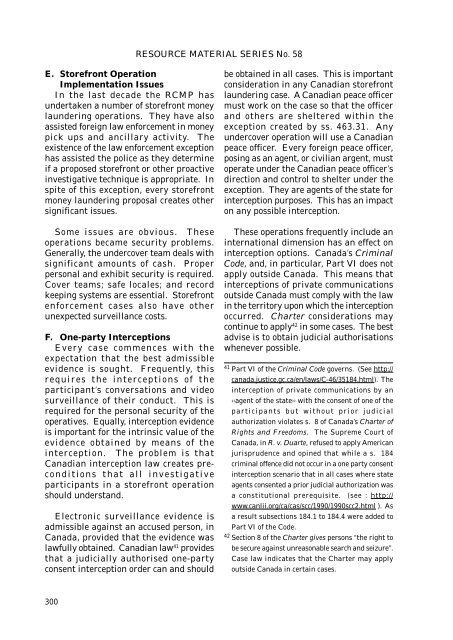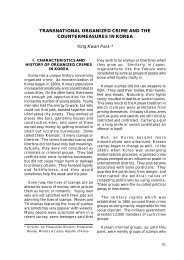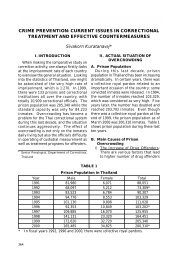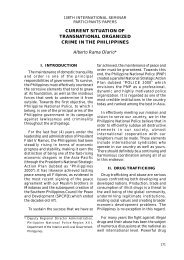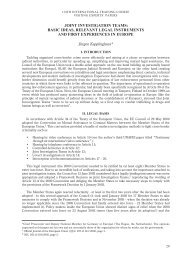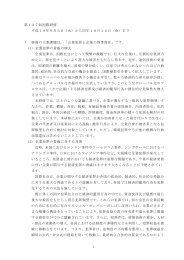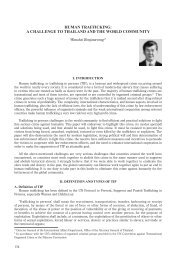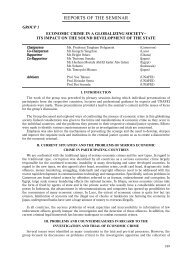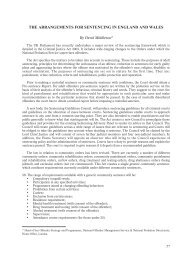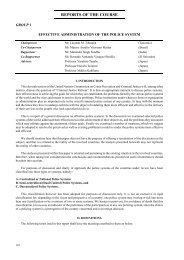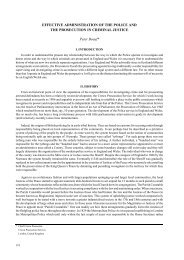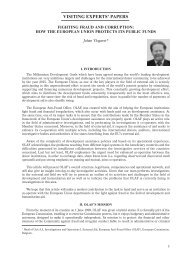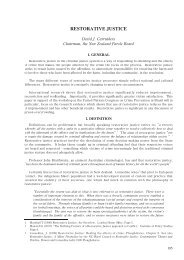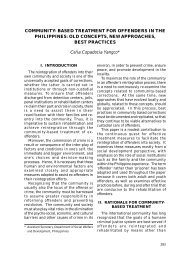CANADA'S ANTI-MONEY LAUNDERING REGIME Daniel P. Murphy *
CANADA'S ANTI-MONEY LAUNDERING REGIME Daniel P. Murphy *
CANADA'S ANTI-MONEY LAUNDERING REGIME Daniel P. Murphy *
Create successful ePaper yourself
Turn your PDF publications into a flip-book with our unique Google optimized e-Paper software.
RESOURCE MATERIAL SERIES No. 58E. Storefront OperationImplementation IssuesIn the last decade the RCMP hasundertaken a number of storefront moneylaundering operations. They have alsoassisted foreign law enforcement in moneypick ups and ancillary activity. Theexistence of the law enforcement exceptionhas assisted the police as they determineif a proposed storefront or other proactiveinvestigative technique is appropriate. Inspite of this exception, every storefrontmoney laundering proposal creates othersignificant issues.Some issues are obvious. Theseoperations became security problems.Generally, the undercover team deals withsignificant amounts of cash. Properpersonal and exhibit security is required.Cover teams; safe locales; and recordkeeping systems are essential. Storefrontenforcement cases also have otherunexpected surveillance costs.F. One-party InterceptionsEvery case commences with theexpectation that the best admissibleevidence is sought. Frequently, thisrequires the interceptions of theparticipant’s conversations and videosurveillance of their conduct. This isrequired for the personal security of theoperatives. Equally, interception evidenceis important for the intrinsic value of theevidence obtained by means of theinterception. The problem is thatCanadian interception law creates preconditionsthat all investigativeparticipants in a storefront operationshould understand.Electronic surveillance evidence isadmissible against an accused person, inCanada, provided that the evidence waslawfully obtained. Canadian law 41 providesthat a judicially authorised one-partyconsent interception order can and shouldbe obtained in all cases. This is importantconsideration in any Canadian storefrontlaundering case. A Canadian peace officermust work on the case so that the officerand others are sheltered within theexception created by ss. 463.31. Anyundercover operation will use a Canadianpeace officer. Every foreign peace officer,posing as an agent, or civilian argent, mustoperate under the Canadian peace officer’sdirection and control to shelter under theexception. They are agents of the state forinterception purposes. This has an impacton any possible interception.These operations frequently include aninternational dimension has an effect oninterception options. Canada’s CriminalCode, and, in particular, Part VI does notapply outside Canada. This means thatinterceptions of private communicationsoutside Canada must comply with the lawin the territory upon which the interceptionoccurred. Charter considerations maycontinue to apply 42 in some cases. The bestadvise is to obtain judicial authorisationswhenever possible.41 Part VI of the Criminal Code governs. (See http://canada.justice.gc.ca/en/laws/C-46/35184.html). Theinterception of private communications by an‹‹agent of the state›› with the consent of one of theparticipants but without prior judicialauthorization violates s. 8 of Canada’s Charter ofRights and Freedoms. The Supreme Court ofCanada, in R. v. Duarte, refused to apply Americanjurisprudence and opined that while a s. 184criminal offence did not occur in a one party consentinterception scenario that in all cases where stateagents consented a prior judicial authorization wasa constitutional prerequisite. (see : http://www.canlii.org/ca/cas/scc/1990/1990scc2.html ). Asa result subsections 184.1 to 184.4 were added toPart VI of the Code.42 Section 8 of the Charter gives persons “the right tobe secure against unreasonable search and seizure”.Case law indicates that the Charter may applyoutside Canada in certain cases.300


